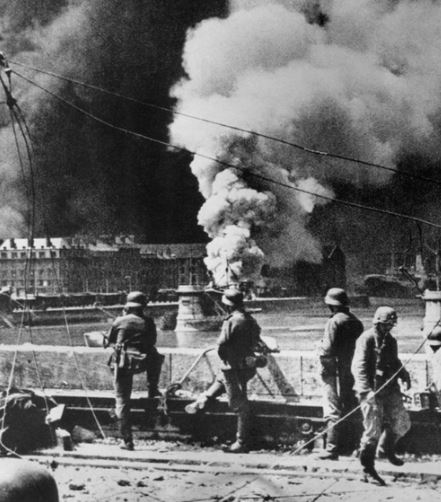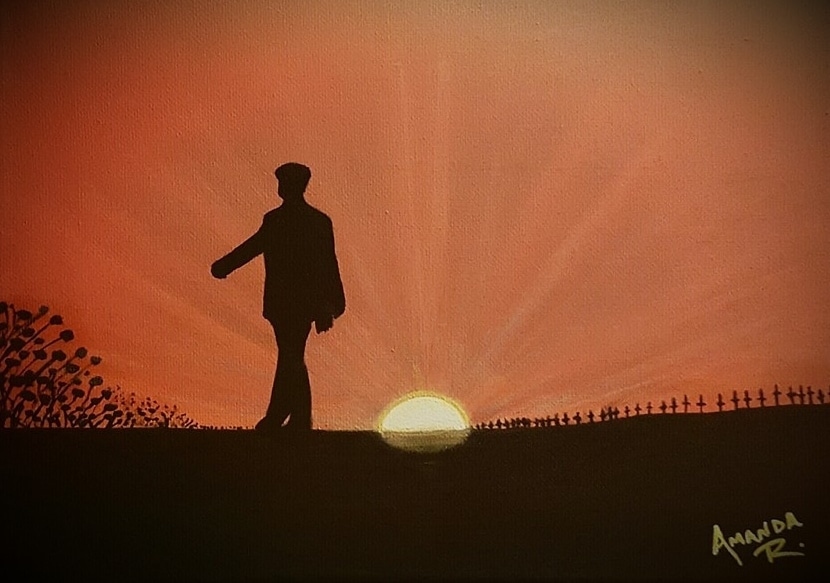In Flanders fields the poppies blow
Between the crosses, row on row,
That mark our place; and in the sky
The larks, still bravely singing, fly
Scarce heard amid the guns below.
This is the first verse of the searing and hauntingly beautiful poem by Canadian doctor/soldier, Lt-Colonel John McCrae. He wrote it in 1915, reportedly after a friend in his unit was killed in the battle of Ypres. As a schoolchild, I heard this poem recited at every Remembrance Day Assembly, although as an adult I can only quote the first two lines. (Or so I thought.
According to a news story today, apparently I’m one of the 52% of Canadians who misquote the opening line of Canada’s Official Poem as “In Flanders fields the poppies grow.” But at least I got the author right. 6% thought it was written by Margaret Atwood, a famous Canadian writer who is not a soldier and who is still alive.)

This year, I’m struck by the lines about the birdsong obliterated by the explosive, muddy din. How many soldiers survived those bloody conflicts, and those in all of the wars since, only to find they had left their good hearing behind them, forever, on the battlefield?
The stats are staggering.
The Toll of War on Hearing Health
 According to the U.S. Veteran’s Benefit Administration, the two most compensated disabilities for returning soldiers are tinnitus and hearing loss. The Center for Disease Control & Prevention (CDC) quotes data showing that veterans are four times more likely to have severe hearing impairment than non-veterans.
According to the U.S. Veteran’s Benefit Administration, the two most compensated disabilities for returning soldiers are tinnitus and hearing loss. The Center for Disease Control & Prevention (CDC) quotes data showing that veterans are four times more likely to have severe hearing impairment than non-veterans.
And it’s not just the military who pay this price—an extreme occupational hazard! Last week at a presentation to members of the Hearing Loss Association of America in Rochester, I met two men whose hearing was damaged due to gunfire. The first was a WWII veteran whose ship was bombed, leaving him with lifelong severe hearing loss. The second gentleman was a recently retired sheriff whose job required him to use his gun, frequently I presume, as he now has permanent noise-induced hearing loss. And he still does target practice, but at least now he uses hearing protection.
In one of the first speechreading classes I taught, there were two WWII veterans, both of whom charmed me out of my tree. Reg was an RAF pilot who escaped from a burning plane crash with his life—and hearing loss. Tom Moss, at 80 still blue-eyed and handsome, had been in the motorcycle corps attached to a Canadian armored tank division—how loud was that? (Pity the guy inside the tank, where the noise reached 115dB!) The only reprieve Tom got from the never-ending noise was when he complained that the officers got real food while the enlisted men had to make do with slop. Because his language was saltier than what I’ve printed here, he spent some time in jail, which was quieter.
You’d think that more than 70 years on, the experts would know how to protect the hearing of people who work in LOUD situations with guns and explosives and whatnot. Is it not enough to ask our people in the military, the police, the firefighters—to risk their lives, to risk physical and emotional damage, without asking them to say pardon for decades to come?
To be fair, according to data included in the publication Noise and Military Service: Implications for Hearing Loss and Tinnitus (2006), things in the military have quietened down. A bit. In the 1960s, someone inside a personnel carrier was exposed to 120dB whereas in 2005, noise in a similar vehicle reached only 118dB max. A comforting thought.
Noise-induced hearing loss can be prevented. How? Well, not going to war or not shooting guns are two possible strategies, to my admittedly naïve and impractical mind. But hey, about wearing hearing protection? Protective devices are, I hope, becoming more sophisticated and efficient.
But tell that to the man or woman whose hearing will never be the same, who hears the incessant sounds of tinnitus—a mocking echo of the noise that caused it in the first place. We can do better.

Readers may also be interested in:
- Hearing Loss in the Trenches of WWI
- WW2 Bomber Crews and the Legacy of Hearing Loss
- Aircraft Noise Reduction During WWII
- Deafening Noise of WW1 Air Combat
**Feature image Marching Onward, painting by Amanda Hollett Roberts. Used with permission.
 Gael Hannan is a writer, speaker and advocate on hearing loss issues. In addition to her weekly blog The Better Hearing Consumer, which has an international following, Gael wrote the acclaimed book “The Way I Hear It: A Life with Hearing Loss“. She is regularly invited to present her uniquely humorous and insightful work to appreciative audiences around the world. Gael has received many awards for her work, which includes advocacy for a more inclusive society for people with hearing loss. She lives with her husband on Vancouver Island, British Columbia, Canada.
Gael Hannan is a writer, speaker and advocate on hearing loss issues. In addition to her weekly blog The Better Hearing Consumer, which has an international following, Gael wrote the acclaimed book “The Way I Hear It: A Life with Hearing Loss“. She is regularly invited to present her uniquely humorous and insightful work to appreciative audiences around the world. Gael has received many awards for her work, which includes advocacy for a more inclusive society for people with hearing loss. She lives with her husband on Vancouver Island, British Columbia, Canada.
**this piece has been updated for clarity. It originally published on November 10, 2015








Wednesday is Veterans Day in the US as well as Canada. Thank you Gael for remembering the toll that war takes on hearing. The US military has been in the forefront of developing hearing protection, however, and many VA hospitals provide excellent hearing care. The Department of Defense’s Hearing Center of Excellence, supported by the Hearing Health Foundation’s Hearing Restoration Project, has developed an innovative treatment for tinnitus, which I wrote about in Hearing Loss Magazine. (http://www.hearingloss.org/sites/default/files/docs/HLM_Mar-April2014_Bouton.pdf)
Thanks Katherine!